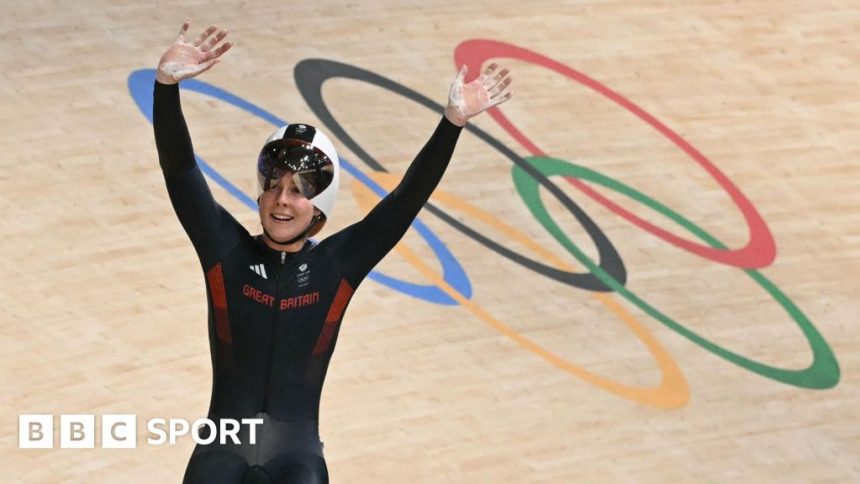Finucane makes history with third medal in Paris
Team GB’s Finucane wins bronze in women’s sprint
-
Published
Track cycling sensation Emma Finucane made British Olympic history by winning individual sprint bronze for her third medal of the Paris Games.
Not since 1964, when Mary Rand won a medal of every colour in athletics, has a British woman taken a hat-trick of podium finishes at a single Games.
For 21-year-old Finucane, appearing at her maiden Olympics, her latest bronze follows the same colour in the keirin as well as a historic team sprint gold.
She comfortably defeated the Netherlands’ Hetty van de Wouw over two legs in the bronze medal final to add an Olympic medal to her World Championship title in the event.
“I feel on top of the world,” Finucane told BBC Radio 5 Live.
“This whole week has been a rollercoaster for me, so many highs and so many lows. That bronze medal felt like a gold medal to me.
“I wanted to be in the gold final, but I had nothing left to give.
“To come away with three medals is more than what I could have dreamed of.”
Ellesse Andrews of New Zealand, who beat Finucane in the semi-finals, won sprint gold, beating Germany’s Lea Friedrich to add to the keirin title she won earlier in the week.
Jack Carlin had been hoping to join Finucane in winning three medals in Paris, but his campaign ended in a brutal crash in the keirin final.
Carlin, who won team sprint silver and individual bronze earlier in the Games, was able to gingerly walk off the track, as was team-mate Hamish Turnbull after he crashed out in the previous round.
It is the first time since Athens 2004 that a British rider has not topped the podium in the men’s keirin, with Sir Chris Hoy and Sir Jason Kenny sharing the last four golds in the event with two apiece.
Instead, Dutch superstar Harrie Lavreysen secured his third Olympic title, and therefore a clean sweep of the sprint events, in Paris.
There was disappointment too for Neah Evans as she finished 15th in the women’s omnium.
The Netherlands’ Lavreysen wins gold in men’s keirin final
Finucane living her ‘teenage dream’
Coming into the action at the Saint-Quentin-en-Yvelines velodrome, hopes had been high that Finucane could become the first British woman to win triple gold at a Games.
She had announced herself on the global stage last year when she bagged the sprint rainbow jersey at the World Championships in Glasgow – the first British rider to do so since Becky James 10 years earlier.
But while her golden hat-trick did not materialise in the French capital, her performances have proved that in Finucane, Great Britain has its latest star of sprinting.
Prior to these Olympics, Team GB had not won a women’s sprinting medal since the Rio Games eight years ago, when James won double silver and Katy Marchant – one of Finucane’s team sprint team-mates in Paris – took a bronze.
Before Monday’s team sprint gold, Finucane’s “hero” Victoria Pendleton was the only British female sprinter to have stood atop the Olympic podium with her individual sprint and keirin golds in 2008 and 2012 respectively.
“It feels amazing. I know I had the expectation coming into these Olympics, but a gold and two bronzes is more than I could have expected,” she told BBC Sport.
“That bronze medal, I literally gave it everything I could.
“I’m really proud to deliver it on the final day. To come home with another medal, it’s unreal, I can’t believe it.”
Sixty years ago in Tokyo, Rand won long jump gold, pentathlon silver and 4x100m relay bronze, 36 years after swimmer Joyce Cooper took three medals home from the 1928 Games in Amsterdam.
On equalling those achievements, Finucane said: “I am living my teenage dream and I love every second of it, but this is my job and I wouldn’t change it for the world.
“I want to keep doing what I do and keep making Britain proud.”
Emma Finucane was competing at her first Olympic Games
‘Great pride in the next generation’
On the track, this was an Olympics that represented a changing of the guard following the retirements of Sir Jason and Dame Laura Kenny since Tokyo, two greats who amassed 12 Olympic gold medals between them.
While the gold count was lower than at recent Games, Finucane’s bronze means Great Britain finish the track cycling in Paris with eight medals, one higher than their Tokyo haul three years ago, and 11 in total across all cycling disciplines.
But the build-up to these Olympics came with many disruptions.
Among the track team, Carlin broke his ankle in April, the same month in which Evans was diagnosed with Epstein-Barr virus that left her struggling to climb stairs.
Katie Archibald was ruled out weeks before the Games got under way after breaking her leg in a freak garden accident, while Dan Bigham nearly saw his debut Olympics curtailed in a training crash the weekend before the track action began.
It was Anna Henderson – one of 15 debutants in the squad – who opened the medal count on the very first day of the Games, taking time trial silver on the rain-soaked roads.
Those conditions were a far cry from the blistering heat experienced at Elancourt Hill two days later, when Tom Pidcock – just 16 days after pulling out of the Tour de France with Covid – defied a puncture to retain his Olympic gold in the mountain biking.
Three years ago in Tokyo, Team GB won four BMX medals but Kieran Reilly was the sole rider to reach the podium this time around, the world champion taking freestyle silver at Place de la Concorde. Beth Shriever, a favourite to defend her BMX racing title, finished last in her final.
And then, to the velodrome, the venue for so much of GB’s Olympic success.
Finucane, Marchant and Sophie Capewell kick-started the medal charge on the boards by winning the nation’s first Olympic women’s team sprint gold.
It was to be the only time the British national anthem was to be heard in the sweltering velodrome, the men’s team pursuit quartet going close against Australia only for Ethan Hayter to slip out of his saddle on the final lap.
In the end, GB finished fourth on the track medal table – based on golds – despite their superior total tally. And for the first time since Athens 2004, Britain did not finish top of the overall cycling medal table, coming fifth in the standings with two golds.
But in Britain’s young riders there is so much potential for the Los Angeles Olympics in 2028 and beyond. Take Josh Tarling, for example. The 20-year-old had been widely anticipated to contest the medals in the road time trial, only for a puncture to curtail his hopes and produce an agonising fourth-place finish.
Speaking on BBC TV, Hoy said: “It’s a great pride watching the next generation, they did us proud.
“It is tough out there. It shows there are such fine margins, we did really well.”
British Cycling performance director Stephen Park said: “As ever, you feel like you’ve left a few on the table, but overall it’s been a fantastic performance.
“We brought 15 first-time Olympians, nine of them are going home with medals. On the track programme, until we swapped in Mark Stewart [for the men’s madison] every single one of our track riders was going home with a medal.
“We’ve won more medals than any other nation and we’re looking forward to getting into LA and doing it all again.”
Related Topics
-
-
Published1 day ago
-
-
-
Published26 July
-






